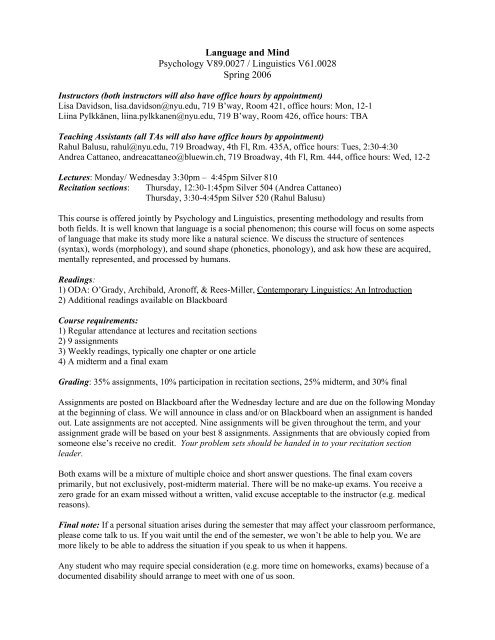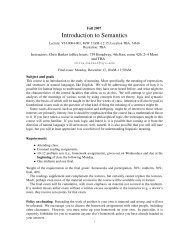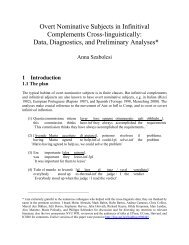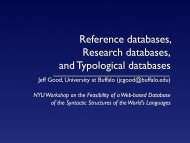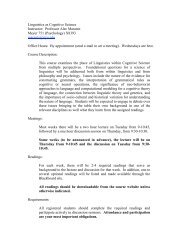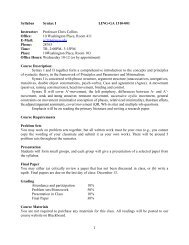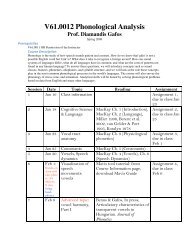Language and Mind Psychology V89.0027 / Linguistics V61.0028 ...
Language and Mind Psychology V89.0027 / Linguistics V61.0028 ...
Language and Mind Psychology V89.0027 / Linguistics V61.0028 ...
You also want an ePaper? Increase the reach of your titles
YUMPU automatically turns print PDFs into web optimized ePapers that Google loves.
<strong>Language</strong> <strong>and</strong> <strong>Mind</strong><br />
<strong>Psychology</strong> <strong>V89.0027</strong> / <strong>Linguistics</strong> <strong>V61.0028</strong><br />
Spring 2006<br />
Instructors (both instructors will also have office hours by appointment)<br />
Lisa Davidson, lisa.davidson@nyu.edu, 719 B’way, Room 421, office hours: Mon, 12-1<br />
Liina Pylkkänen, liina.pylkkanen@nyu.edu, 719 B’way, Room 426, office hours: TBA<br />
Teaching Assistants (all TAs will also have office hours by appointment)<br />
Rahul Balusu, rahul@nyu.edu, 719 Broadway, 4th Fl, Rm. 435A, office hours: Tues, 2:30-4:30<br />
Andrea Cattaneo, <strong>and</strong>reacattaneo@bluewin.ch, 719 Broadway, 4th Fl, Rm. 444, office hours: Wed, 12-2<br />
Lectures: Monday/ Wednesday 3:30pm – 4:45pm Silver 810<br />
Recitation sections: Thursday, 12:30-1:45pm Silver 504 (Andrea Cattaneo)<br />
Thursday, 3:30-4:45pm Silver 520 (Rahul Balusu)<br />
This course is offered jointly by <strong>Psychology</strong> <strong>and</strong> <strong>Linguistics</strong>, presenting methodology <strong>and</strong> results from<br />
both fields. It is well known that language is a social phenomenon; this course will focus on some aspects<br />
of language that make its study more like a natural science. We discuss the structure of sentences<br />
(syntax), words (morphology), <strong>and</strong> sound shape (phonetics, phonology), <strong>and</strong> ask how these are acquired,<br />
mentally represented, <strong>and</strong> processed by humans.<br />
Readings:<br />
1) ODA: O’Grady, Archibald, Aronoff, & Rees-Miller, Contemporary <strong>Linguistics</strong>: An Introduction<br />
2) Additional readings available on Blackboard<br />
Course requirements:<br />
1) Regular attendance at lectures <strong>and</strong> recitation sections<br />
2) 9 assignments<br />
3) Weekly readings, typically one chapter or one article<br />
4) A midterm <strong>and</strong> a final exam<br />
Grading: 35% assignments, 10% participation in recitation sections, 25% midterm, <strong>and</strong> 30% final<br />
Assignments are posted on Blackboard after the Wednesday lecture <strong>and</strong> are due on the following Monday<br />
at the beginning of class. We will announce in class <strong>and</strong>/or on Blackboard when an assignment is h<strong>and</strong>ed<br />
out. Late assignments are not accepted. Nine assignments will be given throughout the term, <strong>and</strong> your<br />
assignment grade will be based on your best 8 assignments. Assignments that are obviously copied from<br />
someone else’s receive no credit. Your problem sets should be h<strong>and</strong>ed in to your recitation section<br />
leader.<br />
Both exams will be a mixture of multiple choice <strong>and</strong> short answer questions. The final exam covers<br />
primarily, but not exclusively, post-midterm material. There will be no make-up exams. You receive a<br />
zero grade for an exam missed without a written, valid excuse acceptable to the instructor (e.g. medical<br />
reasons).<br />
Final note: If a personal situation arises during the semester that may affect your classroom performance,<br />
please come talk to us. If you wait until the end of the semester, we won’t be able to help you. We are<br />
more likely to be able to address the situation if you speak to us when it happens.<br />
Any student who may require special consideration (e.g. more time on homeworks, exams) because of a<br />
documented disability should arrange to meet with one of us soon.
DATE TOPIC READING<br />
1/18<br />
1/23<br />
Introduction to linguistics <strong>and</strong><br />
cognitive science ODA, Chapter 1<br />
Articulatory phonetics: How<br />
humans talk ODA, Chapter 2<br />
1/25 Acoustic phonetics Yeni-Komshian, pp 90-105<br />
1/30<br />
2/1<br />
2/6<br />
2/8<br />
2/13<br />
Speech perception: From the sound<br />
signal to underst<strong>and</strong>ing Yeni-Komshian, pp 105-127<br />
Categorical perception: Is speech<br />
special? Yeni-Komshian, pp 111-116<br />
Neurolinguistic studies of<br />
categorical perception<br />
Audio-visual integration: What cues<br />
do we use to underst<strong>and</strong> speech?<br />
Reading: The relationship between<br />
words <strong>and</strong> sounds<br />
no reading<br />
Massaro & Stork 1998. Speech recognition <strong>and</strong><br />
sensory integration. American Scientist 86:3, p236-<br />
245.<br />
Rayner & Pollatsek. 1989. The <strong>Psychology</strong> of<br />
Reading, Ch 3: Word perception<br />
2/15 Dyslexia Scientific American: 11/01/1996 Dyslexia<br />
2/22<br />
2/20: President’s Day: NO CLASS<br />
Phonology: The mental<br />
representation of sounds ODA, Chapter 3<br />
2/27 First language acquisition of speech ODA, Chapter 11<br />
3/1<br />
Critical period: Is language learning<br />
limited by age?<br />
3/6 Genie (film)<br />
3/8 MIDTERM<br />
3/20<br />
3/22<br />
Newport, E.L. (2002). Critical periods in language<br />
development. In L. Nadel (Ed.), Encyclopedia of<br />
Cognitive Science.<br />
3/13-15: SPRING BREAK<br />
Second language acquisition of<br />
speech ODA, Chapter 12<br />
Lexical access: The mental<br />
dictionary ODA, Chapter 13, 435 – 441<br />
3/27 Lexical access <strong>and</strong> meaning ODA, Chapter 6, pp 201 – 204<br />
3/29<br />
Morphology: The building blocks<br />
of language ODA, Chapter 4<br />
4/3 Past tense debate<br />
Pinker S, Ullman MT. 2002. The past <strong>and</strong> future of<br />
the past tense. Trends in Cognitive Science. Nov<br />
1;6(11):456-463.
4/5<br />
4/10<br />
4/12<br />
Genetic language disorders: SLI &<br />
Williams Syndrome<br />
Oliver Sacks’ Williams syndrome<br />
documentary<br />
Syntax: The grammatical structure<br />
of language ODA, Chapter 5<br />
Gopnik, M. 1997. <strong>Language</strong> deficits <strong>and</strong> genetic<br />
factors. Trends in Cognitive Sciences, 1:1, p. 5-9<br />
Scientific American: 12/01/1997 Williams<br />
Syndrome <strong>and</strong> the Brain<br />
4/17 Syntactic processing ODA, Chapter 13, 441-444 & 451-454<br />
4/19 <strong>Language</strong> breakdown: Aphasia ODA, Chapter 14<br />
4/24<br />
4/26<br />
Sentence meaning, compositional<br />
phenomena ODA, Chapter 6<br />
Sentence meaning,<br />
noncompositional phenomena<br />
5/1 FINAL (in class)<br />
no reading


